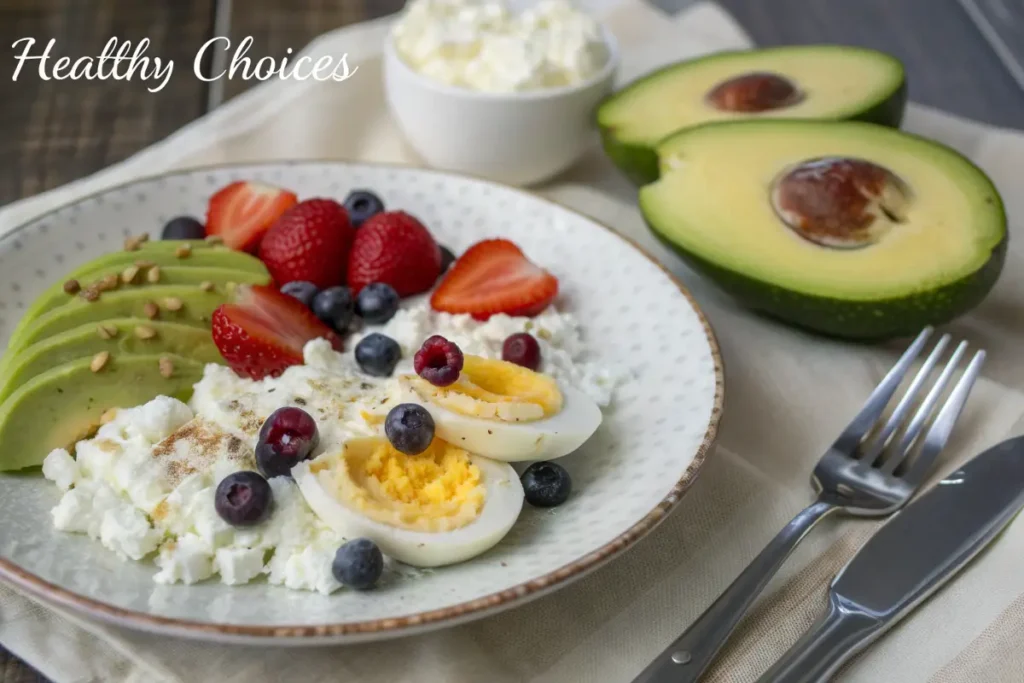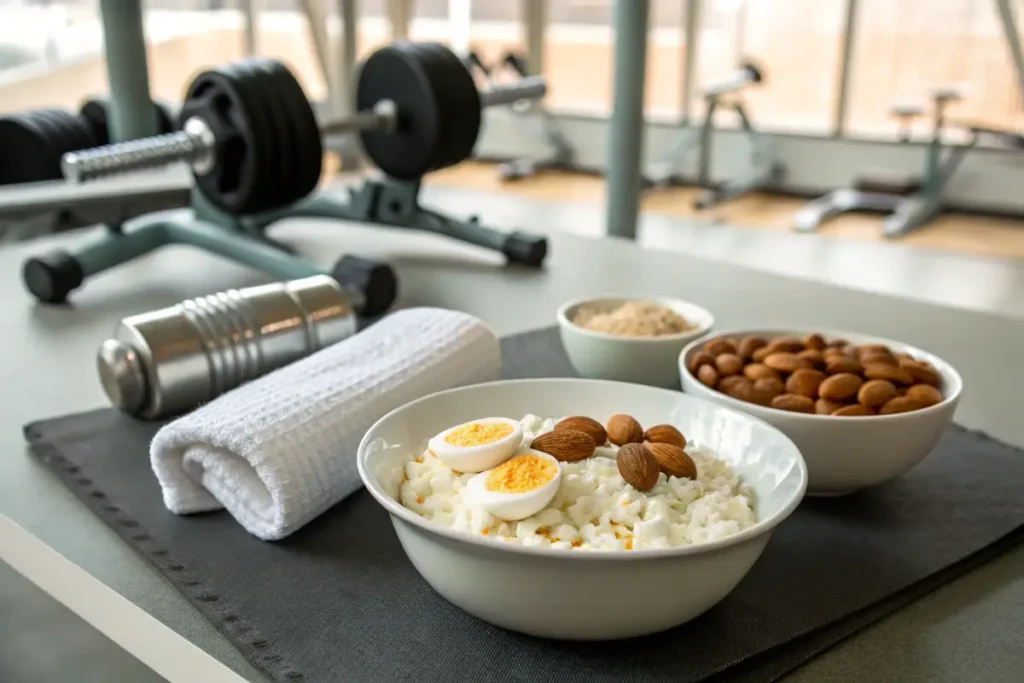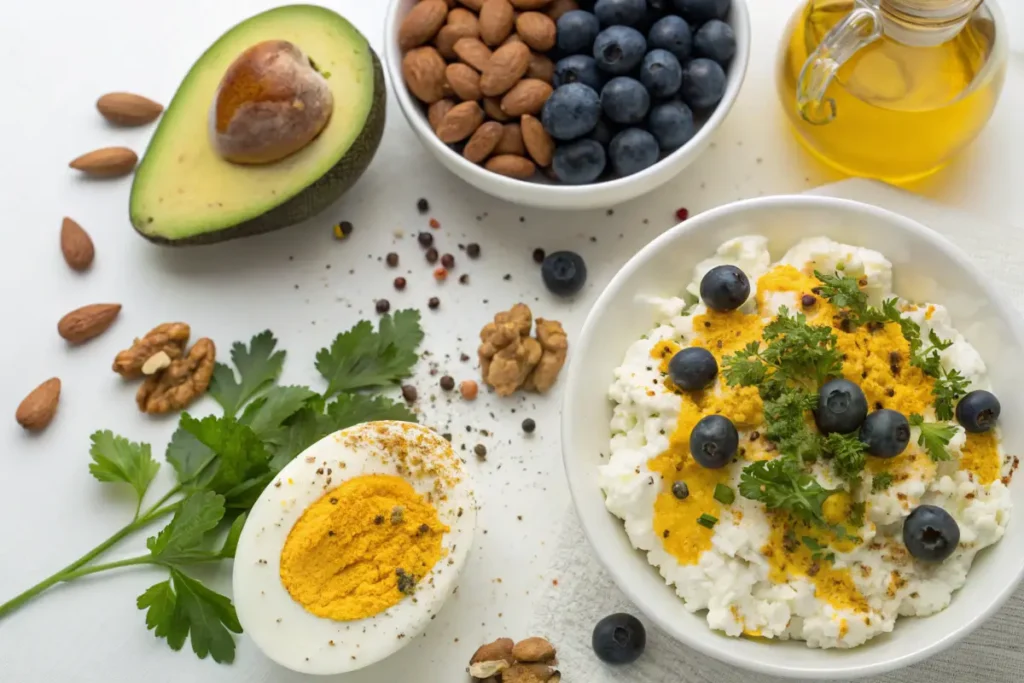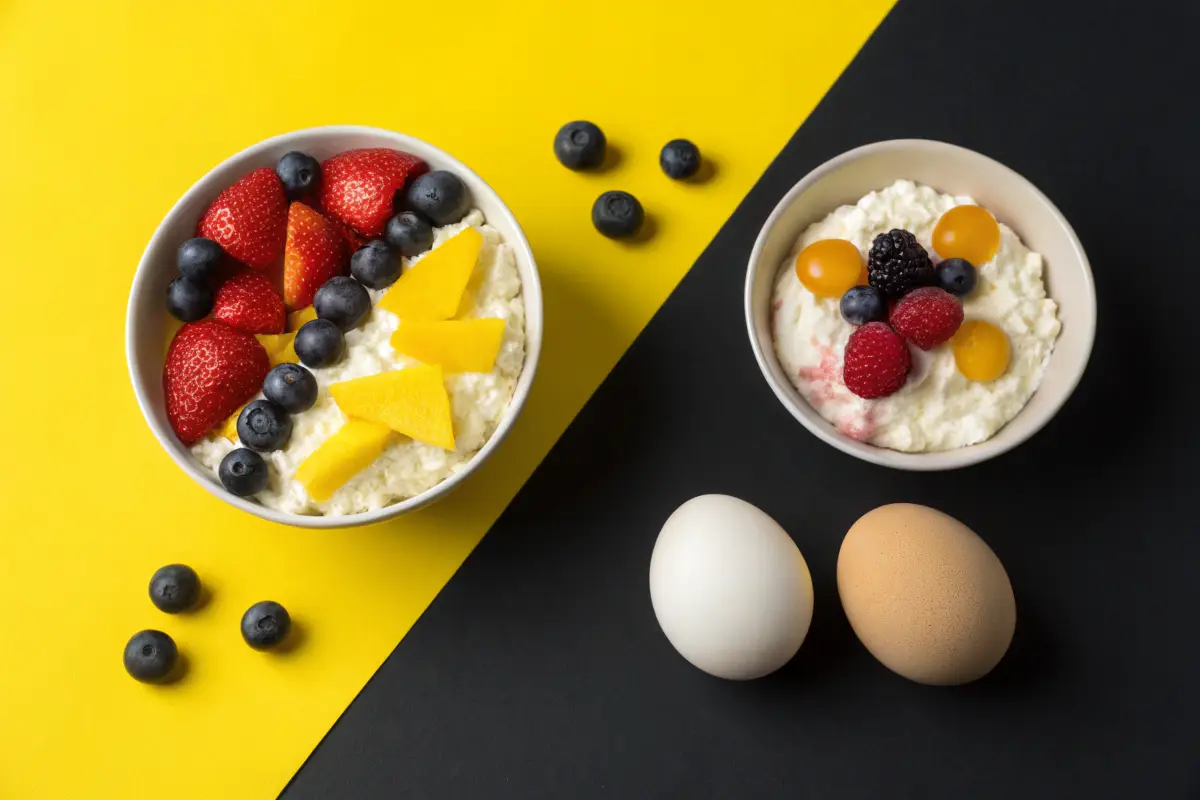Introduction Is cottage cheese better than eggs?
When it comes to choosing between cottage cheese and eggs, many people find themselves wondering, “Is cottage cheese better than eggs?” Both are popular sources of protein and essential nutrients, making them staples in a healthy diet. But which one truly stands out as the better choice? This article dives deep into the nutritional benefits, versatility, and overall health advantages of cottage cheese and eggs, helping you make the best decision for your lifestyle.
Cottage cheese has gained popularity as a low-fat, high-protein option for those seeking weight loss or muscle building. On the other hand, eggs are a timeless superfood, celebrated for their rich nutrient profile and versatility in cooking. Whether you’re looking to build muscle, lose weight, or simply eat healthier, understanding the differences between these two can help you meet your goals.
Throughout this guide, we’ll compare their protein content, calorie count, vitamins, minerals, and other key factors. By the end, you’ll have a clear answer to the question: “Is cottage cheese better than eggs?”

Table of contents
- Introduction Is cottage cheese better than eggs?
- What Makes Cottage Cheese a Nutritional Powerhouse?
- Cottage Cheese vs Eggs: A Side-by-Side Comparison
- Is Cottage Cheese Better Than Eggs for Weight Loss?
- Are Eggs Better Than Cottage Cheese for Muscle Building?
- Which Is Better for Anti-Inflammatory Benefits: Cottage Cheese or Eggs?
- Can I Eat Cottage Cheese Every Day?
- Can I Eat Eggs Every Day?
- FAQs about Is cottage cheese better than eggs?
- Conclusion: Is Cottage Cheese Better Than Eggs?
What Makes Cottage Cheese a Nutritional Powerhouse?
Cottage cheese is packed with nutrients that make it an excellent choice for a variety of diets. Here’s a breakdown of why it’s considered a powerhouse:
High in Protein and Low in Calories
One of the main reasons cottage cheese is so popular is its protein-to-calorie ratio. A 1-cup serving of low-fat cottage cheese provides approximately:
- Protein: 28 grams
- Calories: 163
This makes it ideal for people on a calorie deficit or those aiming to build lean muscle. Its slow-digesting protein, casein, helps with prolonged muscle repair and keeps you feeling full longer.
Rich in Calcium and B Vitamins
Cottage cheese is also a great source of calcium, which supports bone health. Additionally, it contains several B vitamins like B12 and riboflavin, which are crucial for energy production and red blood cell formation.
Ideal for Weight Loss
Due to its high protein content and low-fat options, cottage cheese is a go-to food for people trying to lose weight. Its creamy texture also makes it versatile, easily pairing with fruits, vegetables, or even savory dishes.
Why Are Eggs Considered a Superfood?
Eggs have long been touted as a superfood due to their exceptional nutritional profile. But what makes them stand out in comparison to cottage cheese?
Complete Protein Source
Eggs are one of the few foods that provide a complete protein, meaning they contain all nine essential amino acids that your body can’t produce on its own. One large egg offers:
- Protein: 6 grams
- Calories: 70
This makes eggs a compact, nutrient-dense option for anyone looking to incorporate high-quality protein into their diet.
Rich in Essential Nutrients
Eggs are a great source of choline, an essential nutrient for brain health and liver function. They’re also high in vitamin D, which supports bone health and immunity. Plus, the yolk contains antioxidants like lutein and zeaxanthin, which promote eye health.
Perfect for Versatile Cooking
From scrambled and poached to baked into frittatas, eggs are incredibly versatile. They work as a standalone meal or as an ingredient in more complex dishes, making them a kitchen staple.

Cottage Cheese vs Eggs: A Side-by-Side Comparison
| Nutrient | Cottage Cheese (1 cup) | Eggs (1 large) |
|---|---|---|
| Protein | 28 grams | 6 grams |
| Calories | 163 | 70 |
| Fat | 2.3 grams (low-fat) | 5 grams |
| Calcium | 14% of DV | 2% of DV |
| Vitamin D | 0% of DV | 6% of DV |
| Versatility | Pairs well with fruits, savory dishes | Can be cooked in multiple ways |
This table highlights that while both foods have their unique benefits, your choice depends on your personal health goals. Cottage cheese may be better for weight loss due to its higher protein content and lower calories, while eggs shine in their nutrient density and versatility.

Is Cottage Cheese Better Than Eggs for Weight Loss?
If weight loss is your goal, cottage cheese has the edge due to its high protein and lower calorie content. Protein is essential for preserving lean muscle mass while losing fat, and the casein in cottage cheese provides sustained satiety. Eggs, while nutritious, contain slightly more calories and fat per serving, which may not be ideal if you’re watching your calorie intake.
However, eggs can still play a role in a weight-loss diet, especially when consumed in moderation. Their high protein content and low carb count make them a filling option for breakfast or snacks.

Are Eggs Better Than Cottage Cheese for Muscle Building?
For muscle building, both cottage cheese and eggs have significant benefits. Eggs contain complete proteins with all essential amino acids, making them excellent for muscle recovery and growth. However, cottage cheese, with its high casein content, provides sustained protein release, which is particularly beneficial when consumed before bed.
To optimize muscle building, many athletes and fitness enthusiasts include both cottage cheese and eggs in their diet. For example, cottage cheese can be a nighttime snack, while eggs make an ideal post-workout meal.

Which Is Better for Anti-Inflammatory Benefits: Cottage Cheese or Eggs?
When you think about foods that fight inflammation, both cottage cheese and eggs might not come to mind immediately. However, they do contain several nutrients that can support an anti-inflammatory diet. Inflammation, while necessary in small amounts to help the body heal, can become harmful when chronic. Chronic inflammation is linked to issues such as joint pain, heart disease, and autoimmune disorders. So, how do cottage cheese and eggs compare when it comes to soothing inflammation? Let’s break it down step by step.
Cottage Cheese and Its Anti-Inflammatory Properties
Cottage cheese, while not traditionally considered an anti-inflammatory food, can fit into an anti-inflammatory diet when eaten thoughtfully. For instance, low-fat or non-fat cottage cheese is a better option because full-fat versions contain higher levels of saturated fats, which may promote inflammation in some cases. However, certain nutrients in cottage cheese can still help combat inflammation.
- Probiotics (in certain varieties): Some brands of cottage cheese contain probiotics, which promote gut health. A healthy gut is directly tied to lower levels of inflammation in the body.
- Calcium: Calcium plays a role in reducing inflammatory markers in the body, supporting overall bone and joint health.
- High Protein Content: The protein in cottage cheese helps repair and maintain muscles. This can indirectly reduce inflammation, especially if you’re physically active or recovering from exercise.
To ensure you get the most anti-inflammatory benefits, always check labels and choose options with minimal additives and lower sodium. Too much sodium may lead to water retention, which can worsen inflammation.
Eggs: A Surprising Ally Against Inflammation
Eggs are widely celebrated as a nutritional powerhouse, but they also come with specific anti-inflammatory benefits. However, their effects on inflammation depend largely on how they’re prepared and the overall quality of the eggs you consume.
- Choline: Egg yolks contain choline, an essential nutrient that helps reduce inflammation by supporting brain and liver health.
- Vitamin D: Eggs are one of the few natural sources of vitamin D. This nutrient helps the immune system function properly and is known to lower inflammation throughout the body.
- Antioxidants: The yolks are rich in antioxidants such as lutein and zeaxanthin, which protect against oxidative stress, a common cause of chronic inflammation.
That said, the cooking method matters. For example, boiling or poaching eggs is much healthier than frying them in unhealthy oils, as fried foods can increase inflammatory markers. Choosing pasture-raised or organic eggs can also make a difference since they tend to have higher levels of omega-3 fatty acids, which are known to reduce inflammation.
How to Boost Anti-Inflammatory Benefits with Simple Additions
If you want to maximize the anti-inflammatory effects of cottage cheese and eggs, it’s important to pair them with other nutrient-rich, inflammation-fighting ingredients. Small adjustments to your meals can make a big difference. Here are a few tips:
- Add Anti-Inflammatory Spices:
- Sprinkle turmeric, which contains curcumin, into scrambled eggs or mix it into cottage cheese. Adding black pepper helps your body absorb curcumin more effectively.
- Add a pinch of cinnamon to cottage cheese when serving it with fruits. Cinnamon is a known anti-inflammatory spice that also balances blood sugar levels.
- Incorporate Healthy Fats:
- Combine cottage cheese with avocado slices or drizzle it with flaxseed oil. Both are rich in omega-3 fatty acids, which are proven to lower inflammation.
- Cook eggs in olive oil instead of butter. Olive oil contains oleocanthal, a compound with anti-inflammatory properties.
- Pair with Fresh Produce:
- Serve cottage cheese with antioxidant-rich fruits like blueberries, strawberries, or oranges. These fruits contain polyphenols and vitamin C, which fight inflammation naturally.
- Enjoy eggs with sautéed leafy greens like spinach or kale. These vegetables are packed with vitamins and minerals that reduce inflammation.
- Go for Quality Ingredients:
- Choose organic or grass-fed dairy for your cottage cheese to avoid unwanted additives.
- Opt for pasture-raised eggs, as they are higher in omega-3s compared to conventional eggs.
Are Cottage Cheese or Eggs Better for Fighting Inflammation?
So, is cottage cheese better than eggs for reducing inflammation? The answer depends on your specific dietary needs and how you incorporate these foods into your meals. Cottage cheese offers a boost of probiotics (in certain varieties) and calcium, which both contribute to an anti-inflammatory diet. Eggs, on the other hand, contain antioxidants, choline, and vitamin D, making them a valuable option for fighting inflammation.
To get the best results, consider eating both in moderation as part of a balanced diet. For example, a meal of scrambled eggs cooked in olive oil paired with a side of sautéed spinach and a dollop of cottage cheese topped with fresh berries creates a nutrient-packed, anti-inflammatory dish.

Can I Eat Cottage Cheese Every Day?
Yes, you can eat cottage cheese every day, but moderation is key. Cottage cheese is rich in protein, calcium, and B vitamins, making it a healthy addition to your diet. However, there are a few considerations:
- Watch the Sodium: Many cottage cheese brands are high in sodium, which can contribute to high blood pressure if consumed excessively. Opt for low-sodium or no-salt-added varieties if eating it daily.
- Balance Your Diet: While cottage cheese is nutritious, eating a variety of foods ensures you get a range of vitamins and minerals. Pair it with fruits, vegetables, or whole grains for a balanced meal.
- Check for Lactose Intolerance: If you’re sensitive to dairy, eating cottage cheese daily may cause discomfort. Lactose-free versions are a great alternative.
Incorporating cottage cheese into your daily routine can be a healthy choice, especially when paired with nutrient-dense foods and consumed in moderation.
Can I Eat Eggs Every Day?
Yes, you can eat eggs every day, but like cottage cheese, moderation is important. Eggs are nutrient-dense and high in protein, but there are a few things to keep in mind:
- Cholesterol Consideration: For most people, eating up to one egg per day is safe and doesn’t raise cholesterol levels. However, individuals with high cholesterol or heart disease should consult a doctor.
- Cooking Method Matters: To keep it healthy, prepare eggs by boiling or poaching instead of frying in butter or unhealthy oils.
- Include Other Protein Sources: Variety is crucial in a healthy diet, so balance eggs with other protein sources like fish, beans, or lean meats.
When enjoyed as part of a balanced diet, eggs can be a daily source of high-quality protein and essential nutrients.

FAQs about Is cottage cheese better than eggs?
You can enjoy cottage cheese as a snack, mix it with fruits or veggies, use it in salads, or even add it to smoothies for extra creaminess and protein.
Yes, adding cottage cheese to scrambled eggs makes them creamier and boosts protein content. Plus, it adds a subtle, tangy flavor to your breakfast.
You can eat cottage cheese 2-3 times a week, but balance it with other protein sources. Low-sodium options are better if eaten frequently.
Cottage cheese is better for weight loss due to fewer calories, while eggs are richer in nutrients like vitamin D. Both are excellent for protein intake.
Two eggs provide 12 grams of protein, which is great for most people. However, your daily protein needs depend on your weight and activity level.
The most common way is to eat it plain or with fruits like pineapple or berries. It’s also popular as a topping for salads or baked potatoes.
Yes, it’s great for weight loss! Cottage cheese is low in calories, high in protein, and keeps you full for longer, reducing the urge to snack.
Cottage cheese is generally healthier as it’s lower in calories and fat than ricotta. However, ricotta is creamier and has more calcium.
People eat cottage cheese plain, with fruits, or in savory dishes like salads and casseroles. It’s also popular as a dip or toast topping.
Conclusion: Is Cottage Cheese Better Than Eggs?
The answer to whether cottage cheese is better than eggs depends on your specific health goals and dietary needs. Cottage cheese is a great choice for weight loss and muscle recovery due to its high protein content and lower calorie count. It also contains calcium and, in some cases, probiotics, which support bone and gut health.
Eggs, on the other hand, are a nutrient powerhouse. They provide complete proteins, essential vitamins like choline and vitamin D, and antioxidants that promote overall health. Eggs are more versatile in cooking, making them a convenient option for various meals.
If you’re looking for fewer calories and sustained satiety, cottage cheese might be the better choice. However, if you want a broader nutrient profile, eggs have the edge. Ultimately, both foods are highly nutritious, and including both in your diet can give you the best of both worlds.

